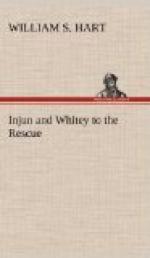And as Buck and Tom rode, Whitey could see them firing their guns almost in the faces of the foremost maddened steers. They were trying to divert the leaders, and thus turn the herd until it would circle in its course, and finally the entire mass of beasts would be running round and round, in a course known as “milling.” And there Whitey learned the real use the cowboy has for his gun.
What was going on beyond, Whitey could not see, and he could hear nothing above the uproar of the storm, and the clamor of the stampede, except the faint cracking of the guns of Tom and Buck. As Whitey held the almost fear-maddened Monty in check, the wild-eyed steers, with lowered heads and panting sides, sped by. At their head Whitey saw Tom swing nearer toward the leaders, then he saw Tom no more. There were two dangers to be feared in that mad race; if a steer fell, the others would trip over it, and many of them would die; if a man were caught in the rushing mass, it meant sure death.
Morning came, with the sun graying the low clouds, from which fell a cold drizzle; a setting drear enough for the scene the boys were to witness. A handful of gaunt men, sad but determined, their spent, drooping horses near by, stood facing a shallow grave scooped out of the prairie. Near it lay a blanket-covered figure that the dreaded stampede had crushed into a shape of which Whitey feared to think.
As the cowboys lowered the shape into the grave, Buck Milton turned his head away for a moment. Then he said simply, “Tom was my pardner for nine years.” And again, after a pause, “And who’s goin’ t’ tell his gal over on the Little Divide?”
There seemed no need for words just then, for after their grief for their friend the men’s faces showed the turn of thought to his murderers, the sheepmen. Whitey never had seen the intent to kill come into men’s faces before. It was grim, but not repulsive, for in a way there was justice in it. And poor Tom, who yesterday had been less than a name to Whitey, had now become the central figure in a tragedy.
But no one could have told what Injun thought. He, who came of a race that held vengeance above most things, looked on, seemingly unmoved.
Followed busy days on the Star Circle, during which Walt Lampson probably forgot the existence of Whitey and Injun. It was doubtful to the boys that he even noticed them when they rode back to the ranch house, after the funeral of Buck’s friend Tom. Whatever thoughts of revenge were cherished by Walt and Buck had to be held in check while the stampeded herds were rounded up from the many-mile radius of prairie over which they had strayed.
To do this the entire force of the Star Circle was needed. Divided into parties the men rode north, east, south, and west for a distance of about twenty miles. Then they trailed round and round, in a great, narrowing circle that took in that wide radius, and as the cattle were met, in bunches or small herds, they were gathered and driven into a common center until they formed one great herd.




